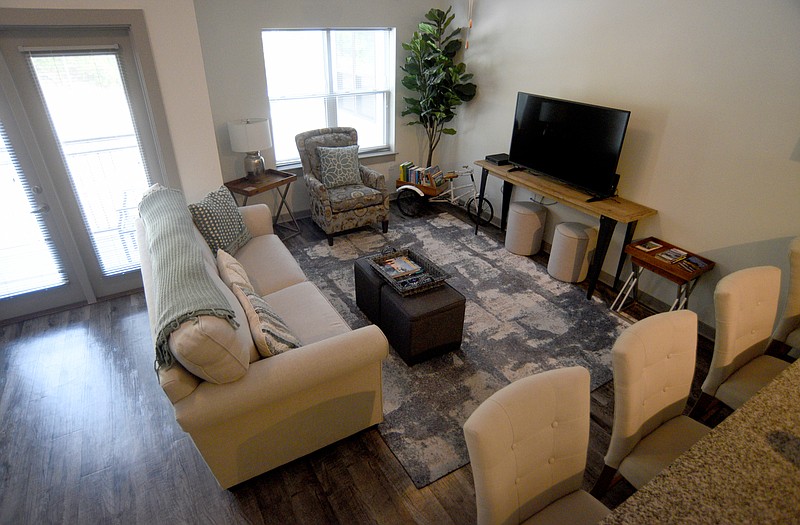A group of Chattanooga property owners has formed to oppose more restrictive rules for short-term vacation rentals up for approval at the City Council's meeting on Tuesday — a set of regulations that one of the ordinance's co-sponsors does not expect to pass.
"These are constitutional private property rights issues that they're trampling all over," Brad Wardlaw, a member of the board for the Greater Chattanooga Coalition for Private Property Rights, said in an interview Monday alongside other short-term vacation rental owners.
The coalition has a five-member board, Wardlaw said, and there are approximately 100 people or more on its email list. It has so far raised about $25,000 for legal fees.
___
DOCUMENT
___
The city divides short-term vacation rentals into two categories: Absentee rentals where the property owner doesn't live on the property and homestay rentals where the owner does live on the property.
In April 2022, the Chattanooga City Council enacted a temporary pause on new absentee permits as they looked to refine the city's existing regulations. Members of the coalition have been participating in focus groups and workshops with city officials since that time but have grown frustrated with the approach leaders have taken. The moratorium is scheduled to end in July.
(READ MORE: Soddy-Daisy extends suspension of short-term rental applications)
After months of discussions, the council is now prepared to consider on final reading Tuesday an updated ordinance that would establish new density requirements for short-term vacation rentals along with other changes to the city's rules.
However, one of the co-sponsors of the legislation -- Councilman Chip Henderson, of Lookout Valley -- said by phone that he does not expect it will pass Tuesday. The other co-sponsor -- Councilwoman Jenny Hill, of North Chattanooga -- said in a text that she was on vacation and not available to talk.
At the urging of Councilwoman Marvene Noel, of Orchard Knob, no new absentee rentals would be allowed within 1,000 feet of another absentee property in a single-family detached zoning district -- larger than the 500-foot radius that was initially included in the ordinance. Henderson voted against the measure after that amendment passed. Additionally, no more than 5% of units in a multi-family dwelling could be reserved for absentee short-term vacation rentals.
"It's effectively a ban," Wardlaw said of the requirements, which would make identifying an eligible property like finding a needle in a haystack.
The ordinance would also create an appointed board that would review objections to vacation rental applications, a responsibility currently held by the council, and increase the cost of applying for and renewing permits. Additionally, the city plans to appoint an administrative hearing officer that would enable officials to charge a fine of up to $500 a day for illegally operated units.
Citing data from the Vacation Rental Management Association, which works on behalf of the industry, the coalition said vacation rentals resulted in $93 million worth of total direct spending by visitors to Chattanooga in 2022.
"This bolsters our entire city economy," Wardlaw said. "We're helping the restaurant industry, we're helping the cleaners, we're helping the service techs. We're helping all kinds of other small business owners because of the dollars we bring in here."
A Chattanooga native, Wardlaw is a licensed real estate agent and owns two short-term vacation rentals: One in Chattanooga and another in Marion County. He had planned on establishing at least one more in the city but stopped after the moratorium went into effect.
Under the city's existing rules, new vacation rentals are only allowed in a designated area, which mostly includes the districts represented by Noel, Henderson, Hill, Councilwoman Raquetta Dotley, of East Lake, and Councilwoman Demetrus Coonrod, of Eastdale. Chattanooga's current regulations, Wardlaw said, aren't terribly burdensome, but he does have a major problem with the limited area.
"I think it's tantamount to redlining," Wardlaw said, referring to a discriminatory housing practice dating back to the early 20th century that classified majority Black and minority neighborhoods as risky candidates for loans or investment.
The designated area also isolates short-term rental properties to certain parts of Chattanooga, Wardlaw stated, resulting in high densities in certain areas that officials have maligned in the past.
In an ideal world, owners said, the city would simply regulate life-safety measures, performing inspections to ensure properties are appropriate for guests.
Kendall Petersen, another member of the coalition board, said the short-term vacation rental market is essentially self-regulated -- there's only so much demand for the units citywide, and prices often have to fluctuate depending on economic conditions.
"I've seen a ton of people leave the market," he said. "If we have 1,000 Airbnbs in the city and you've only got 400 people traveling, you've got over 600 homes that are not going to be booked."
Petersen said the city is addressing the issue as if there are tens of thousands of short-term vacation rentals taking over the city and altering the social fabric of neighborhoods, which he said isn't accurate.
"Even with the density, to say we're losing character in our neighborhoods is not true because there are very few," he said.
According to estimates from AirDNA, there were 936 short-term vacation rentals in the city of Chattanooga as of June 2022, encompassing 1.2% of all residential properties. The district represented by Councilwoman Raquetta Dotley, of East Lake, had the most with 245, taking up 3.6% of residential properties, and the district of Councilman Ken Smith, of Hixson, had the least with six, constituting 0.1% of residential properties. His district is outside the designated area.
Only about 440 of those 936 properties were properly permitted, and most of those, 320, were absentee rentals.
Numbers provided by Chris Acuff, an assistant professor at the University of Tennessee at Chattanooga, seem to indicate that vacation rentals do increase the property values of surrounding homes, he said in an email. That can be good for homeowners, he said, but it does increase the cost of housing overall.
Mayor Tim Kelly's spokesperson, Kirsten Yates, said in an email Monday that the ordinance itself is not a proposal brought forward by the Kelly administration, but the mayor "does generally support changes to existing short-term vacation rental legislation to the extent that the changes are on solid legal footing, help preserve our local supply of affordable housing and are fair to our local small business community.
"The administration understands there are significant concerns about the legislation as currently proposed and will continue to work with Chattanooga City Council to ensure that any adopted legislation is legally sound, protects the character of our neighborhoods and appropriately considers the impacts that short-term vacation rentals can have on our supply of affordable housing," she said.
Contact David Floyd at dfloyd@timesfreepress.com or 423-757-6249.

